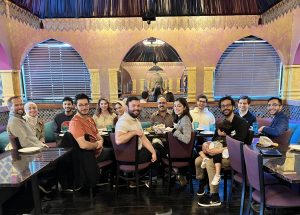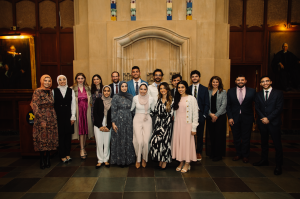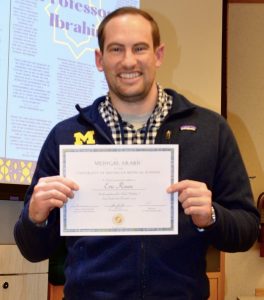“I will erase my knees, I will eat it [my knees]…so that I will not kneel to an aggression, an army, or an era” – Muhammad Al-Maghout
سأمحو ركبتي بالممحاة , سآكلها .. حتى لا أجثو لعسكر أو تيار أو مرحلة. – محمد الماغوط
This profound quote originates from my late grandfather, the renowned Syrian poet and playwright, Muhammad Al-Maghout. His fearless exploration of contentious themes, deeply rooted in the socio-political context of the Arab world, alongside an unwavering dedication to Arab identity, social progress, and human rights, continues to resonate with modern thinkers and activists, solidifying his role as a transformative figure in Arab culture and intellectual discourse.

Me (left) and Noor Alesawy (right), one of Medical Arabic’s native speakers and a current master’s student at John Hopkins University.
Inspired by my grandfather’s enduring legacy, I embarked on my own transformative journey during the Branches – the inception of Medical Arabic in fall of 2022. As a University of Michigan medical student, I am resolute in upholding the values of justice, freedom, and human rights that he championed. This purpose is particularly resonant in southeast Michigan, where the state ranks as the second-largest haven for Arab Americans nationwide. The Detroit Metro Area, historically a magnet for Arab refugees and immigrants due to its vibrant automotive industry, encapsulates this cultural dynamism. It’s within this backdrop that Medical Arabic was developed, an innovative platform uniting over 700 healthcare professionals from across the United States in their pursuit of Arabic language proficiency.
This endeavor was born from my reflections on experiences with Arabic-speaking patients during my clinical year, including the unique challenges they faced in accessing healthcare. During my Step 1 study period, a flexible four-week window provided by the University of Michigan’s Medical School, I spent early mornings and late nights creating materials and worksheets to facilitate the language learning process, connecting with Middle Eastern and Arabic Language faculty at University of Michigan, and developing an innovative curriculum that would be feasible to run. I aimed for every student who joined Medical Arabic to forge a bridge—a bridge that transcends language, connecting hearts, healing communities, and uplifting the voice of every patient, regardless of the language they speak.

The executive board’s welcome lunch with our faculty advisors.
I actively sought perspectives from a diverse array of ethnic and religious groups who share Arabic as a common tongue, ensuring their meaningful representation within the framework of the Medical Arabic curriculum. This encompassed connecting with Egyptian Copts, Moroccan Jews, and Sudanese Christians, among other communities. I aspired to infuse the very essence of cultural richness and representational equity into the tapestry of the Medical Arabic curriculum through this spirited amalgamation of voices. I delved deep into the intricacies of medical education, the dynamics of healthcare leadership, and the intricately woven art of rallying support from a diverse community for a cause that had long remained overlooked and underrepresented.
Guided by the mentorship of Dr. Shahzad Mian, Dr. Emad Abou-Arab, and Professor Ibrahim Khalaylih, who have exhibited exceptional dedication to nurturing medical trainees at the University of Michigan, we seamlessly integrated healthcare perspectives into our content. Bringing this project to fruition required the collective effort of a diverse executive board, spanning multiethnic, multilingual, and multireligious backgrounds. Comprising medical, pharmacy, and dental students alongside undergraduates, this dynamic group worked together to meticulously craft curriculum and create content for our upcoming fall language workshops. With financial support from the Office of Multi-Ethnic Student Affairs, Dr. Abou-Arab’s Office for Health Equity and Inclusion grant, and the Gorenflo award from the Department of Family Medicine, our alliance rapidly drew together over 400 participants in just three months.

The executive board at our first annual Ramadan iftar.
Over the past year, we’ve organized a series of 12 language sessions catering to a range of skill levels. These sessions were complemented by culturally enriched seminars, drawing insights from Arab history, literature, and traditions. By integrating references to historical events, notable figures, and cherished cultural practices, we aimed to instill a deep sense of pride in Arab heritage. Our discussions ventured into essential themes, including Arab immigration trends in southeast Michigan, their influence on healthcare, barriers to healthcare screening, and more.
I created partnerships across campus, such as with Kellogg Eye Center’s Culture Committee, to host Arabic in Ophthalmology sessions. The impact was significant, drawing over 90 participants from Kellogg’s faculty and staff – a testament to the potency of language in creating bridges of understanding.
Our dedication to the community found expression through actions that extended beyond traditional boundaries. A poignant example is our initiative to provide free iftar meals to fasting healthcare professionals during Ramadan. This innovative endeavor marked a pioneering step at the University of Michigan, and its significance is further supported by its inclusion in a manuscript currently under review in a medical journal. In line with our partnership with El Harissa, I advocated for the donation of a portion of sales from the iftars to the Delonis Center, a local shelter that annually provides essential services and emergency shelter to approximately 1,200 individuals. Collaborations with local bookstores, like Literati in Ann Arbor, have allowed us to explore the significant literary works of Arab leaders, including a late winter book talk on the Syrian refugee experience. On a national stage, we proudly sponsored the 2023 Global Surgical Innovation Conference in Ann Arbor, advocating for equitable surgical care access in underserved regions worldwide.

My classmate, M4 Eric, receiving his completion certificate.
Similar to Al-Maghout’s literary creations encompassing poetry, drama, and prose that advocated justice, freedom, and human rights, the core of Medical Arabic is grounded in the pursuit of these very ideals. Our movement operates as a conduit for unity and awareness, resonating with the transformative power of language. Through each interaction and connection we cultivate, Medical Arabic dismantles barriers, igniting impactful change.
As I reflect on these endeavors, a common thread of purpose emerges – a commitment to fostering connections, sparking change, and making a meaningful impact. Each collaboration and initiative supports the potential for transformation that lies within collective effort. In my medical career ahead, I carry forward this spirit, armed with the belief that purposeful actions, no matter how small, can create ripples of positive change that extend far beyond our immediate surroundings.
Don’t miss the next Dose of Reality.
Lena Juratli is a fourth-year medical student at the University of Michigan Medical School. When she’s not achieving her daily German learning goal on Duolingo, you can find her exploring the latest Yemeni coffee shop in Dearborn with her siblings.
